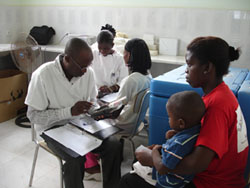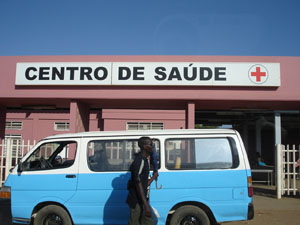Malaria is widely cited as the leading killer of children in Luanda, home to approximately one-third of Angola’s population.
And How Can a Country’s Technical Capacity Be Developed? A PMI Team Answers Both Questions
The true burden of malaria in Luanda, the capital of Angola, has been a matter of debate. Malaria is widely cited as the leading killer of children in Luanda, home to approximately one-third of Angola’s population. Clinic records show that more than half of patients who come to health facilities in Luanda have fever, a symptom of malaria, and many of them are diagnosed with and treated for malaria. However, a nationwide survey showed that the percentage of children with malaria in Luanda was low (5.5 percent), and very few malaria-transmitting mosquitoes were found during a recent mosquito trapping study in Luanda. To resolve the question, a PMI team conducted a survey to determine malaria prevalence in Luanda and therefore how best to combat malaria there.
Is There Malaria in Luanda?
The PMI-funded survey was conducted in 30 health facilities and hospitals throughout Luanda. The team, composed principally of Angolans from the National Institute for Public Health Malaria Reference Lab, the Provincial Health Department Malaria Program, and the National Malaria Control Program, enrolled up to 30 patients with fever in each facility. Each of the nearly 900 participants had a blood test for malaria and answered a questionnaire about where they lived, malaria exposures, and their travel history.
The team found that of participants with fever, only 3.7 percent actually had malaria, and only a few participants with malaria had traveled outside Luanda. The results were even more striking when the health centers were grouped by distance away from the city center. Participants with fever at health facilities more than 15 kilometers (about 9 miles) away from the city center were almost seven times more likely to have malaria than participants at health centers within 15 kilometers.
Based on these results, the Provincial Health Department and the National Malaria Control Program are planning to focus treatment and prevention efforts in the rural areas surrounding Luanda and improve diagnosis and treatment of febrile illnesses in Luanda.
How Can A Country’s Capacity Be Built?
According to Dr. Julie Thwing, CDC medical epidemiologist and survey team lead, “Because of the strong host country involvement, Angola took ownership of the assessment, and because of the strong Angolan ownership, the potentially controversial results were more readily accepted.”
What Worked?
- Most importantly, Angolans comprised the majority of the team. Angolans from the National Institute for Public Health Malaria Reference Lab, the Provincial Health Department Malaria Program, and the National Malaria Control Program were involved with all aspects, from protocol and questionnaire development, recruitment and hiring of staff, and communications with selected health facilities, to training, supervision during implementation, and preparation of results. Because of Angolan involvement, the team had access to nurses and expert laboratory technicians, health facilities, and local authorities that it might not otherwise have had.
- Rapid data collection allowed for rapid dissemination and rapid decisionmaking. The questionnaires were programmed into personal digital assistants (PDAs) which sped up the process of interviewing (no need to write answers by hand). PDAs also made data collection speedy, since, at the end of each day, all data were downloaded into a central database. One day after the surveys were completed, the team was able to present preliminary results to the director of the Provincial Health Department, who thanked the team not only for conducting the assessment, but also for providing fast results that would enable him to make decisions about resource allocation. Two days later, preliminary results were presented to a wider group of partners, including members of the Provincial Health Department, WHO, UNICEF, PSI, and Chemonics, who then discussed results and determined strategies for implementing recommendations.
- Expertise of the Malaria Reference Lab in Angola. Participants’ rapid malaria blood test results were confirmed by the reading of malaria slides by Angolan microscopists who had been trained the previous year through the efforts of an expert laboratory team from CDC/Atlanta, funded by PMI, and had scored exceptionally well in testing.
Says Susan Brems, USAID Mission Director, Angola, “The work that PMI did on malaria in Luanda is, to my mind, the best kind of operational research… It heavily involved local actors, ensuring both buy-in of the results and capacity building in operations research…It validly tested a new technology—the PDA—in a field setting and added to knowledge on the value of rapid diagnostic tests. And, most importantly, it resulted in concrete findings that are now informing public health strategies for combating malaria in Luanda.”


